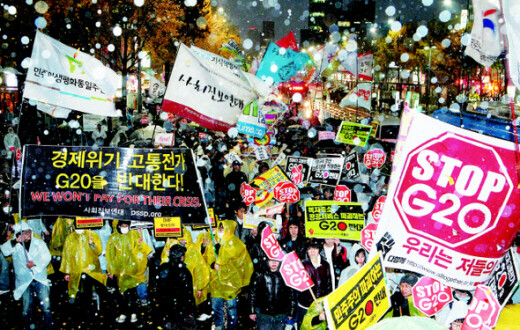hankyoreh
Links to other country sites 다른 나라 사이트 링크
S.Korea unaccommodating to NGOs at G-20

By Lim Ji-sun
Korean People’s G-20 Response Action, an organization comprising 84 civic and social groups, adopted a “Joint Statement Concerning the G-20 Summit in Seoul” Wednesday following the four-day International People’s Conference, Seoul meeting. But the content of civil society’s declaration could not be conveyed to journalists from the G-20 nations.
The media center, introduced by the G-20 Summit preparatory committee as the “largest in G-20 history,” is fitted with 1,330 seats, 132 broadcasting booths, a buffet restaurant, cafe, and lounge. Journalists registered for the event alone amount to 4,288 people from 63 countries. While it may be the world’s largest in scale, its operation and composition seems to fall short. The decision to carry promotional briefings there crafted by the preparatory committee, with access by civil society completely shut off, led to charges that it is a “media center where communication is stifled.”
Madeline Koch, managing director of the G-20 Research Group at the University of Toronto, visited Washington, DC, Pittsburgh, London, and Toronto when G-20 Summits were held in those cities.
“At the Toronto meeting in June, there was an alternative media center for NGOs across the street from the main media center,” Koch said. “Previously, G-20 host nations have provided spaces where NGOs could express their views to the press, whether they were positive or negative.”
Koch went on to say, “Communication between NGOs and the press is very important, and South Korea should make efforts to facilitate this.”
“It is a mistake for South Korea to prevent NGOs from expressing their views while hosting the G-20 Summit,” said Nicholas Rigillo, a journalist with dpa, Germany’s largest news agency. “South Korea needs to give an opportunity for contact between journalists and NGOs, which aids in people’s understanding complex issues.”
The Asian Human Rights Commission (AHRC) strongly condemned Thursday in a statement the South Korean government’s prohibition of entry against activists of civil society movements from other countries without reason and the refusal to grant a visa to the main organiser for ‘World March for Women’ which is going to be held during the G-20 summit in Seoul.
There was also an incident Thursday where the organizers appeared to discriminate against South Korean civic organizations. At 4 p.m. that day, a joint NGO press conference on development and growth was held in the No. 327 conference room at COEX. But the G-20 preparatory committee only announced the event thirty minutes beforehand, brought along only those journalists who assembled within ten minutes, and held the press conference without an interpreter and with the door to the conference room closed.
Only four international NGOs attended the press conference, including Save the Children, Oxfam, and Global Call to Action Against Poverty.
An official with the G-20 Seoul Preparatory Committee said, “We provided tickets only to groups that took part in the trade counsel office outreach, not to domestic groups.”
The official added, “As far as I am aware, NGOs have never been permitted access to media centers at G-20 summits.”
Please direct questions or comments to [englishhani@hani.co.kr]
Editorial・opinion
![[Column] Park Geun-hye déjà vu in Yoon Suk-yeol [Column] Park Geun-hye déjà vu in Yoon Suk-yeol](https://flexible.img.hani.co.kr/flexible/normal/500/300/imgdb/original/2024/0424/651713945113788.jpg) [Column] Park Geun-hye déjà vu in Yoon Suk-yeol
[Column] Park Geun-hye déjà vu in Yoon Suk-yeol![[Editorial] New weight of N. Korea’s nuclear threats makes dialogue all the more urgent [Editorial] New weight of N. Korea’s nuclear threats makes dialogue all the more urgent](https://flexible.img.hani.co.kr/flexible/normal/500/300/imgdb/original/2024/0424/7317139454662664.jpg) [Editorial] New weight of N. Korea’s nuclear threats makes dialogue all the more urgent
[Editorial] New weight of N. Korea’s nuclear threats makes dialogue all the more urgent- [Guest essay] The real reason Korea’s new right wants to dub Rhee a founding father
- [Column] ‘Choson’: Is it time we start referring to N. Korea in its own terms?
- [Editorial] Japan’s rewriting of history with Korea has gone too far
- [Column] The president’s questionable capacity for dialogue
- [Column] Are chaebol firms just pizza pies for families to divvy up as they please?
- [Column] Has Korea, too, crossed the Rubicon on China?
- [Correspondent’s column] In Japan’s alliance with US, echoes of its past alliances with UK
- [Editorial] Does Yoon think the Korean public is wrong?
Most viewed articles
- 1‘We must say no’: Seoul defense chief on Korean, USFK involvement in hypothetical Taiwan crisis
- 2N. Korean delegation’s trip to Iran shows how Pyongyang is leveraging ties with Moscow
- 3‘Weddingflation’ breaks the bank for Korean couples-to-be
- 4Korea sees more deaths than births for 52nd consecutive month in February
- 546% of cases of violence against women in Korea perpetrated by intimate partner, study finds
- 6Will NewJeans end up collateral damage in internal feud at K-pop juggernaut Hybe?
- 7[Column] Park Geun-hye déjà vu in Yoon Suk-yeol
- 8[Editorial] New weight of N. Korea’s nuclear threats makes dialogue all the more urgent
- 9Amnesty notes ‘erosion’ of freedom of expression in Korea in annual human rights report
- 10“Parental care contracts” increasingly common in South Korea